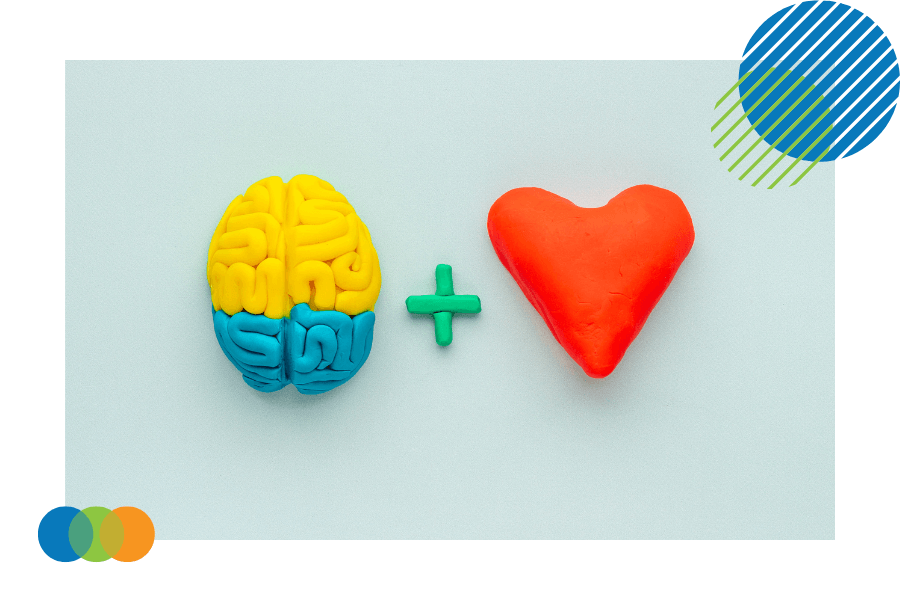 |
Written by Liz McDermott |
Have you ever wondered how some people easily navigate workplace relationships while others struggle? The answer might lie in the advantages of emotional intelligence. The benefits of emotional intelligence in the workplace are far-reaching, impacting everything from team cohesion to leadership effectiveness. As businesses evolve, understanding and managing emotions is becoming just as crucial as technical skills.
This article explores the science behind emotional intelligence and its real-life applications in professional settings. You'll learn how emotional intelligence at work shapes customer relations and helps manage organizational change. We'll answer questions like why emotional intelligence is important in the workplace and explain it with examples. We'll also look at ways to measure and boost emotional intelligence, giving you practical tools to enhance your team’s work life. By the end, you'll see why emotional intelligence is a game-changer for personal and organizational success.
|
This article is brought to you by Vubiz’s Introduction to Emotional Intelligence online course, designed to help you improve your own emotional intelligence. |

The Science Behind Emotional Intelligence
Neurological basis of EI
Emotional intelligence has a strong neurological foundation. The prefrontal cortex plays a crucial role in human social-emotional processing, influencing our ability to understand and manage emotions. Research has shown that the ventromedial prefrontal cortex, frontal cortex, amygdala, and nucleus accumbens are all connected to emotional intelligence. These brain regions work together to help us recognize, process, and respond to emotional stimuli.
Psychological aspects of EI
Psychologically, emotional intelligence involves understanding and managing one's own emotions as well as recognizing and influencing the emotions of others. It encompasses four domains of emotional intelligence: self-awareness, self-management, social awareness, and relationship management. These components work together to enhance one's ability to navigate social situations, communicate effectively, and make better decisions in the workplace.
EI vs. IQ in the workplace
While IQ has long been considered a predictor of success, emotional intelligence is gaining recognition as an equally important factor in workplace performance. Studies have shown the importance of emotional intelligence in the workplace as a stronger predictor of performance than IQ. Research indicates that emotional intelligence accounts for two of three essential skills for effective performance across various job positions worldwide.
Leaders with high emotional intelligence tend to excel in empathy, conflict resolution, and team motivation. They can also create a positive work environment more effectively, foster collaboration, and adapt to changing circumstances. This makes emotional intelligence a valuable asset in today's dynamic workplace, where team cohesion and adaptability are crucial for success.
Emotional Intelligence and Customer Relations
So why is emotional intelligence important in the workplace? Emotional intelligence plays a crucial role in customer relations and significantly benefits businesses. Connecting with your customers' emotions has an enormous payoff. Emotional intelligence strongly influences customer loyalty and satisfaction.
Improved customer service
Emotionally intelligent employees excel at understanding and addressing customer needs. They can recognize emotional cues, adapt their communication style, and respond empathetically to customer concerns. This leads to smoother interactions and more effective problem-solving. Studies show that up to 86% of customers are more likely to return to businesses where they've positively interacted with agents.
Enhanced client relationships
Building strong client relationships is essential for business success, and emotional intelligence is key to this process. When you use emotional intelligence in customer interactions, you can better understand client needs, build trust, and deliver exceptional service. Emotionally intelligent employees are skilled at active listening, asking clarifying questions, and communicating clearly. This helps create deeper connections with clients and fosters long-term relationships built on trust and understanding.
Increased customer loyalty
Emotional intelligence has a significant impact on customer loyalty. When customers feel understood and valued, they're more likely to remain loyal to your brand. In fact, according to Deloitte's Customer Drivers report, 62% of customers say they feel an 'emotional connection' to the brands they buy from most often. Recognizing and validating customer emotions can turn negative experiences into positive outcomes, boosting satisfaction and business growth.
Investing in employee emotional intelligence training is crucial to harnessing emotional intelligence's benefits in customer relations. This can help them develop the skills to create exceptional customer experiences and build lasting client relationships.
EI's Role in Change Management
Emotional intelligence plays a crucial role in managing organizational changes effectively. Leaders with high emotional intelligence can successfully navigate change management challenges, leading to better outcomes for employees and the organization.
Adapting to organizational changes
Change can be emotionally intense, sparking employee confusion, fear, and anxiety. Leaders with strong emotional intelligence can recognize these emotions and address them proactively. They understand that resistance to change is often rooted in fear or concern about the future rather than disloyalty. By empathizing with employees' concerns and actively listening to their feedback, emotionally intelligent leaders can tailor their approach to meet the specific emotional needs of individuals and teams.
Supporting team members during transitions
During times of change, emotionally intelligent leaders prioritize their teams' mental and emotional well-being. They check in with employees regularly, offer support, and provide resources to help them cope with change challenges. This compassionate approach enhances employee morale and creates a more positive and productive work environment. Studies show that organizations with highly engaged teams driven by emotionally intelligent leaders see a 21% greater profitability.
Maintaining productivity during upheaval
Emotional intelligence is key to maintaining productivity during periods of change. Leaders who effectively manage their and team members' emotions are better equipped to keep everyone focused and motivated. They can inspire and motivate employees by connecting with them, making the change more meaningful and compelling. This approach helps to foster a culture of resilience and adaptability, which is crucial for navigating the complexities of change while maintaining high performance.
Measuring and Assessing Emotional Intelligence
EI assessment tools
Various assessment tools have been developed to gauge the benefits of emotional intelligence in the workplace. These tools help organizations measure and evaluate emotional intelligence among their employees. Some popular EI assessment tools include the Mayer-Salovey-Caruso Emotional Intelligence Test (MSCEIT), the Emotional Quotient Inventory 2.0 (EQ-i-2.0), and the Trait Emotional Intelligence Questionnaire (TEIQue). These assessments focus on different aspects of emotional intelligence, such as perceiving emotions, using emotions to facilitate thought, understanding emotions, and managing emotions.
Interpreting EI scores
Interpreting emotional intelligence scores provides valuable insights into an individual's strengths and areas for improvement. Generally, EI scores range from 0 to 100, averaging 50. Higher scores indicate a higher level of emotional intelligence. For instance, a score of 70 or above suggests above-average emotional intelligence, reflecting strong communication skills and problem-solving abilities. Understanding these scores can help individuals and organizations identify areas where emotional intelligence can be enhanced to improve team cohesion and workplace performance.
Implementing EI-based improvements`
Once EI scores are interpreted, organizations can implement targeted improvements to enhance emotional intelligence in the workplace. This may involve developing leadership programs that strengthen EI competencies, conduct skill-building workshops, and foster open team communication. By implementing these strategies, organizations can harness the benefits of emotional intelligence, leading to improved team performance, reduced conflict, and stronger customer relationships. Real-life examples of emotional intelligence in the workplace often showcase how these improvements can positively impact organizational success.
Conclusion
In conclusion, emotional intelligence is crucial in the workplace, impacting everything from team cohesion to customer relations. Understanding the science behind emotional intelligence, its psychological aspects, and its impact on workplace performance is essential for personal and organizational success.
By recognizing the neurological and psychological basis of emotional intelligence, businesses can invest in emotional intelligence training for employees to enhance their EQ in the workplace. This will ultimately lead to improved customer relations and effective change management. As businesses continue to evolve, emotional intelligence is a game-changer for navigating the complex dynamics of the modern workplace.
Need emotional intelligence training?
Consider Vubiz’s Introduction to Emotional Intelligence online course to help your workforce improve their own emotional intelligence.
